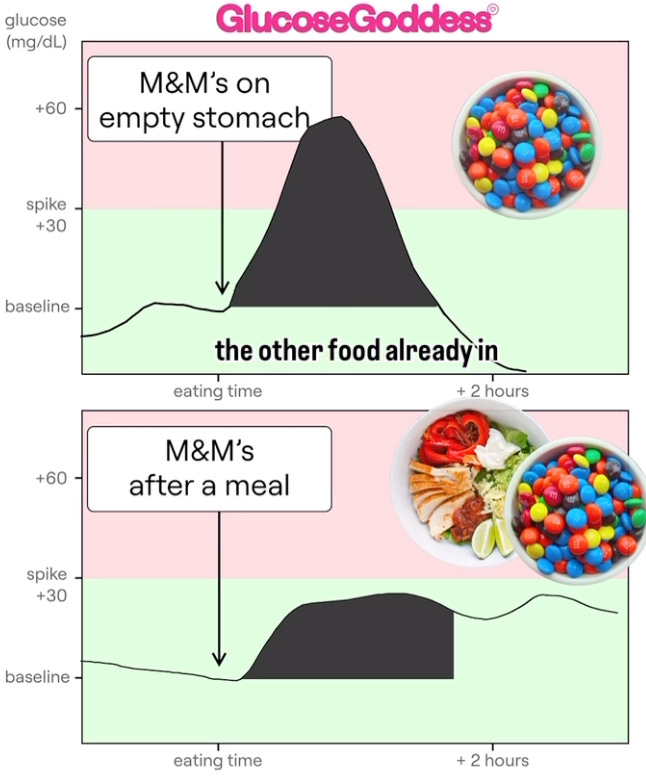One basic pillar of health we should all understand is Blood Sugar and its impact on energy, weight, and overall health. When we master our blood sugar, we are improving one of the most essential processes of our body: the breakdown and storage of glucose. This post will be the first of many related to glucose and blood sugar, so let’s start by defining a few terms:
Glucose is a simple sugar, a monosaccharide, and our body's preferred energy source. Our bodies break down the carbohydrates and sugars we eat into glucose molecules, which they use for energy. Glucose is our brain and much of our muscles’ preferred energy source.
Blood Sugar is the concentration of glucose within our blood at any given moment. Two hormones in our body, insulin & glucagon, help to regulate our blood sugar and prevent us from having too low (hypoglycemia) or too high (hyperglycemia) levels.
Glycation is the process in which glucose molecules attach to proteins or fats in the body. This process is a continuous process that occurs from birth to death. The issue is that this process produces advanced glycation end products (AGEs) and free radicals; which can lead to inflammation and aging, while also increasing our risk of chronic disease.
More definitions to come, but for now let’s focus on these.
The two categories of food that break down into glucose that we consume are: carbohydrates and sugars. Carbohydrates include foods such as bread, rice, and pasta. Sugars include foods such as whole fruits, fruit juice, and desserts. Beginning in the mouth with our saliva, a combination of chemical and physical processes begin to digest these foods. Very simply put, these foods break down into glucose and enter the bloodstream. Once they enter the bloodstream, our pancreas is signaled to release insulin to “pick up” this glucose from the bloodstream and transport it. Our bodies prefer to store glucose in our liver and muscle cells, and when these are full, the excess glucose gets stored in fat cells.
The ultimate goal is to not “spike” our blood sugar too much. How might we cause one of these spikes? When we ingest carbohydrates or sugars on their own, our body breaks them down very quickly and this leads to an overwhelming amount of glucose in the bloodstream, aka a spike. If you have ever worn a continuous glucose monitor, you know what this will look like and if not, this image below shows what a blood sugar spike would look like after ingesting a common dessert.
Source: Glucose Goddess on Instagram- https://www.instagram.com/glucosegoddess/
What is interesting to note from this image is that when you consume sugar or carb on its own, you experience a greater blood sugar spike rather than if you had the dessert after consuming a meal containing other nutrients such as protein and fiber. Why? When we first ingest protein or fiber, we coat the lining of our digestive tract with a protective layer that slows the rate of glucose entering the bloodstream. The takeaway from this point is to make sure that you consume your carbs and sugar with a source of protein, fat, or fiber rather than on its own.
You may be wondering why blood sugar spikes are so bad. There are a few reasons I want to touch on today. First, is the burden that blood sugar spikes put on our mitochondria. If you remember from high school biology, the mitochondria are the powerhouse of the cell. It is their job to turn the glucose we ingest into energy (aka ATP). When we ingest high amounts of glucose, especially on its own, we overwhelm the mitochondria with an abundance of work leading to us feeling fatigued. Mitochondria, in this overwhelmed state, may then also produce free radicals which can cause inflammation throughout the body.
Another cause of inflammation is the process that I defined at the beginning; glycation. We can think of glycation as one of the processes in our body that we want to use as little as possible. As Glucose Goddess explains, when our body is “fully glycated” we die! The more blood sugar spikes and crashes we have, the more that our body is using this process to move that glucose out of our blood into the liver, muscle, and fat cells. As you may have gathered by now… the solution is to limit our blood sugar spikes as much as possible.
The final tip I want to outline in this first post is the benefits of consuming 1 Tbsp of vinegar in a large glass of water before your largest meal of the day. Now, I have done research on the benefits of vinegar for promoting our digestive enzymes to kick into gear before eating, but it was Glucose Goddess that taught me about how it helps to balance blood sugar as well. By priming our system for the food we are about to eat, we cause the body to enlist the digestive enzymes in our stomach to digest and absorb the nutrients that we consume most efficiently. What I have come to understand is that the vinegar gets converted into acetic acid in our bodies which interacts with the digestive enzymes and helps to reduce the blood sugar spike we experience by up to 30%!
Side note, you can use any kitchen vinegar you prefer (my go-to is typically apple cider vinegar), however, always dilute it in water as straight vinegar can damage the enamel of your teeth. For this same reason, be wary of vinegar-containing gummies or drinks that may be marketed to you.
Resources:




Worth wearing a continuous glucose monitor?